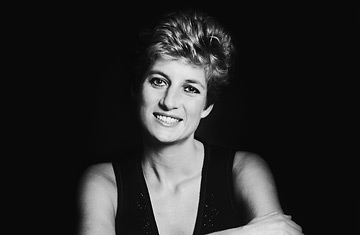
Princess Diana, Princess of Wales (1961 - 1997) posing against a dark background, circa 1995.
(3 of 5)
Indeed, last month the Queen even hinted that she had given up wearing fur except on her ceremonial robes. What's next: a nose ring? Not likely (although body piercing has invaded the Palace: Princess Anne's daughter Zara is sporting a stud in her tongue). But there's no doubt that change is afoot in the hallowed House of Windsor. With the Queen's consent, Tony Blair's Labour government decommissioned the royal yacht Britannia, saving taxpayers some $12 million a year. Royal travel expenses became public, revealing, among other extravagances, the Queen's $17,600 trip aboard the royal train to 1997's Derby horse races. The Queen put up no resistance to the government's proposal to abolish primogeniture (an eldest son's right to precede an older sister to the throne). And, on her own initiative, the Queen pronounced an end to compulsory bowing and curtsying (though they're still appreciated).
Further fine-tuning of the Queen's image awaits the arrival of her new $368,000-a-year communications director, Simon Lewis, 39, who is due to start work in September. But the media are already impressed. "The Queen showed a new face to the nation," the Mail on Sunday editorialized after the monarch had chatted with rock singer Julie Thompson, 21, at a Buckingham Palace function in April. "She publicly embraced, for the first time, the generation that will decide the future of the House of Windsor and won it over."
Public opinion may be harder to sway. "We have become a lot less reverential and a lot less deferential," says royals author Brian Hoey. "People no longer believe royalty walks on water." But if they no longer rule the waves, the royals still serve a purpose. "The monarchy provides the social glue that binds people together," says Pimlott. And, as the headlines of the past year show, "people remain enormously interested in all things royal."
In Britain the measure of a bounder can often be gauged by the number of his former lovers who have vented to the press. Earl Spencer, the man once known as Champagne Charlie, certainly has had his share. But Josie Borain, 35 — the former Calvin Klein model who accompanied the earl to Diana's funeral and supported him through his messy divorce from wife Victoria before quietly dumping him in January — looked like a holdout. For a while.
"I found him calculating and manipulative," Borain finally blurted to the Mail on Sunday in July, adding that Spencer, 34, had cheated on her at least once and had had some 20 lovers during his marriage. "Generally," she said of their 10-month affair, "it was a bad investment, a waste of good-quality-loving time."
Harsh as that salvo was, it was just the latest in a year that saw the earl accused of all kinds of bad behavior, from disloyalty (for criticizing the Diana, Princess of Wales Memorial Fund, of which his sister Lady Sarah McCorquodale is president, for not dispensing its monies with dispatch) to profiteering (by charging a $16 entry fee to the Diana museum he created at Althorp).
For his part, Spencer is "battered, but unbowed," by criticism of the Althorp memorial, he told his local newspaper The Northampton Chronicle. "If it was more subtle, it would be hard to deal with. But as it is, it is just ludicrous," he said of complaints such as those over the potential traffic snarls that could have accompanied the 152,000 pilgrims who visited in July and August. (No such problem arose.) "She was my sister after all . . . and if we are proud of what we are doing, then that is all we can achieve."
As for Spencer's golden moment at Diana's funeral, where he eulogized his sister eloquently while castigating the royal family, it is now at best a tarnished memory and at worst another excuse for a public flogging. "William and Harry did not appreciate it at all," says the British Press Association's Archer. "There was a relative — their uncle — criticizing their father, who is, after all, all they have left now."
Spencer has tried to continue Diana's legacy. Last month he took William abseiling. And in March he followed in Diana's footsteps to Cambodia to highlight the plight of victims of land mines. "He was horrified by what he saw," says Philip Dixon, chairman of the Cambodia Trust, which Diana had supported. "The corridors were full of beds of people in various degrees of disability."
If the experience changed him, then all the better, says former lover Chantal Callopy, 39, who supported her new friend Victoria Spencer through the acrimonious divorce in November. (In a settlement, Victoria got $3.2 million and her Capetown house; and she retained joint custody of children Kitty, 7, twins Eliza and Katya, 6, and Louis, 4, who will stay in Capetown, where Spencer also has a home.) "He has probably done a lot of soul-searching," Callopy says. "Maybe, with this charity work, he has found a niche."